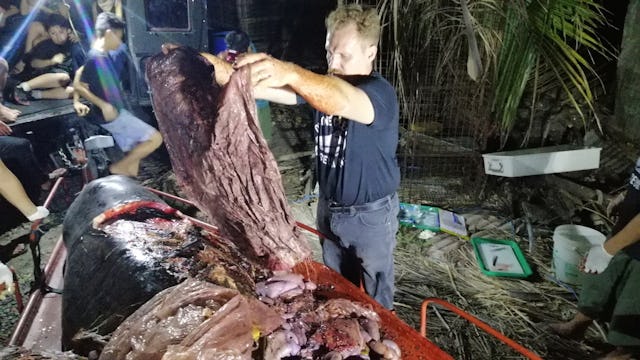A Young Whale Found Dead In The Philippines Had Ingested 88 Pounds Of Plastic

The cause of death for the young whale was dehydration and starvation due to the plastic in its stomach
A juvenile whale found beached in the Philippines over the weekend was found to have 88 pounds of plastic garbage in its stomach – and it likely died from dehydration and starvation due to the trash clogging its digestive system.
More and more species of wildlife are being affected by plastic waste in the world’s oceans, and this was one of the worst cases of ingested plastic that has been seen to date.
In a post that has been shared almost 8,000 times since Saturday, the D’Bone Collectors Museum in Davao City, Philippines, reported that they had attended a necropsy on the male curvier beaked whale and witnessed the trash that was removed from the animal’s stomach.
“I was not prepared for the amount of plastic,” the museum’s owner and founder, Darrell Blatchley, told CNN. “Roughly 40 kilos of rice sacks, grocery bags, banana plantation bags and general plastic bags. Sixteen rice sacks in total.”
D’Bone Collector Museum Inc/Darrell Blatchley
The whale, which weighed approximately 1,000 pounds and was 15 feet long, was seen vomiting blood before its death.
“The plastic in some areas was so compact it was almost becoming calcified, almost like a solid brick,” Blatchley told The New York Times. “It had been there for so long it had started to compact.”
D’Bone Collector Museum Inc/Darrell Blatchley
“It’s disgusting,” he wrote at the end of his post. “Action must be taken by the government against those who continue to treat the waterways and ocean as dumpsters.”
When whales ingest plastic, it makes them feel full even though they aren’t, which can lead to weight loss and malnutrition. But more importantly, since whales get all of their water from their food sources, it can lead to dehydration and death.
While many whales have been found with plastic in their stomachs in recent years, 88 pounds is perhaps the most we have seen yet.
“In the last 10 years we have recovered 61 whales and dolphins, of which 57 have died due to fishing nets, dynamite fishing, and plastic garbage,” Blatchley told Scary Mommy. “Four were pregnant. This cannot continue.”
Image via D’Bone Collector Museum Inc/Darrell Blatchley
Earlier this year, a young sperm whale washed up on a Spanish beach with 64 pounds of plastic waste in its stomach and intestines – in that case, scientists believe it died of severe inflammation. And in November 2018, a dead whale found in Indonesia had over 1,000 pieces of plastic in its stomach, though it was too decomposed for researchers to determine the cause of its death.
Whales are far from the only species to be affected by plastic waste in our oceans – they just get a lot of coverage because of their size and the vast amounts of garbage they can ingest. Other suffering species include sea turtles, sea birds, and hundreds of species of fish.
Image via D’Bone Collector Museum Inc/Darrell Blatchley
Every year, humans add an estimated 8.8 million tons of plastic to our oceans, and the Philippines are one of the worst countries in the world when it comes to plastics pollution in their waters – only China and Indonesia are worse. The cause of the problem there? A mix of a culture of single-use plastic, unenforced garbage laws, and problems with their system of recycling.
Still, although the Philippines has a larger plastics problem than we do doesn’t mean that individuals can’t all make lifestyle changes to help the issues – starting, certainly, with not using plastic grocery bags and minimizing single-use plastic whenever possible. Secondly, reusing or recycling plastics can also help battle what is becoming a larger and larger environmental issue with each passing year.